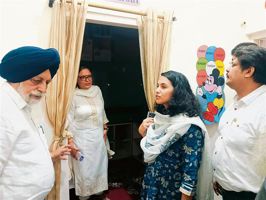
Usha Albuquerque
Digital technology has changed our lives in many ways, but the most dramatic is its effect on the music landscape. Music can be created today at the press of a button or a swipe. Electronic and digital music, or tech music as it is often called, can be created or performed on any electronic device — a computer, an electronic effects unit, even the basic cell phone. All you need is suitable software. No wonder, more and more music aficionados are making a career out of tech music.
One needs proper training and professional expertise to make a career in tech music. The tech music technologist or sound engineer records, edits, manipulates and mixes sounds by using technology in order to give shape to an artist's or record producer's creative vision. Nowadays, all sound is recorded digitally using new technology.
There are several prospects for those interested in a career in the digital tech music field — from working in studios, producing and recording music, sound engineering, recording, background sound mixing, dubbing, and so on, to working on the sets of live shows, concerts and events, and even as DJs. Some of the jobs are:
Music producers: They write, arrange, produce, and record songs. They even shape the sound of other artist's album or create beats or songs for their own projects.
Record producers: They guide the production of a record by coaching the musicians and directing the recording and production process.
Recording engineers: They shape the sound of a music album or video. They record, edit, and mix sounds through their choice of microphones, setting levels and sound-manipulation techniques. They need to be well-versed in all kinds of recording technology.
Audio engineers: They set up the recording equipment used to capture and shape the sound of an album.
Studio managers: They ensure the studio runs efficiently by overseeing building maintenance and upkeep of the studio. They also need to be clued into the latest in music tech equipment.
Mixing engineers: They mix the various sound elements of a track to balance the volume and improve audio quality. This is done by mixing the various elements of a song, (vocals, instruments, production effects) so the volume of each component sounds right, and all parts blend harmoniously.
DJs: A DJ provides music at a party, or event. DJs must consistently work to refine their craft and produce new music under their own names. They also need to be familiar with multiple types of technology-and-mixing software.
Foley artist: The artist reproduces everyday sound effects for films and other media in post-production by using physical props, and not computer technology. These reproduced sounds can be anything, from the swishing of clothing to squeaky doors and breaking glasses.
Although recording software enables one to record at home now, but to make a track hit the charts, one would require the skills of tech music professional. Formal education is sometimes necessary to learn how to use a new gear or software, and to follow production trends and methods.
Getting in
Since this is a partly creative and partly a technical field, a background in science is not necessary, although it can be helpful. Physics and maths enable one to deal with sound, which is physical energy, and for working on a range of calculations, converting sound waves into electric energy, calculating a delay time or reverberation of the room and so on. Knowledge of computers is essential, since most of the music recording today is digitised. Learn to use different audio editing software, including ProTools, Reason, Digital Performer, Live, or Logic.
While most tech music professionals get into this field after experimenting at home, working as a DJ, or in studios, and moving up from there does require formal training. In this way, you will not only get a better and in-depth understanding of the discipline of music, but also get exposure to the latest equipment, and trends in sound recording.
There are degree as well as diploma-level courses for students after Class XII or graduation. Such courses involve a comprehensive study of all the disciplines related to the field, including the mathematics and physics of sound, acoustics, digital technologies, and the business of recording and production, and music. Some courses also include work experience and internships with recording studios.
Job prospects
As a music technologist or sound engineer, you can look for openings in music and film recording studios, broadcast and dubbing studios, television channels and software companies. Companies dealing with recording audio cassettes, CDs and music videos, radio stations and channels and advertising agencies also recruit tech music specialists. In addition, there are event management companies, specialising in musical shows, those working in theatre, concert and show facilities that hire such professionals.
Radio stations too have in-house studios. One can also work on cruise liners as their sound and light technician.
Sound engineering is also important in film mixing, as we have seen in the case of Resul Pookutty's Oscar winning film Slum Dog Millionaire. With some experience and a good network of contacts, you can even set up your own studio, for which the investment could be as little as Rs 1 lakh.
So if you have worked on live shows in college, or spent hours creating music compositions on your computer, or love the job of a DJ, your hobby and passion can become a full-fledged career.
Go ahead, create your own career track!
Institutes to go for...
- The Film and Television Institute of India, Pune, an autonomous institution under the Ministry of Information and Broadcasting, offers a three-year full-time postgraduate diploma course in sound recording and sound design, and also a postgraduate certificate course in sound recording and television engineering. Bachelor's degree holders in any discipline who have studied physics at the Class XII level are eligible for admission.
- The Satyajit Ray Film and Television Institute, conducts a three-year full-time residential postgraduate diploma course in cinema audiography. Bachelor's degree holders who have studied physics in Class XII are eligible for admission.
- The MGR Government Film and Television Institute, CIT Campus, Chennai offers diploma courses in film technology and television production (sound recording and engineering). Candidates who have done Plus II with physics and chemistry or diploma holders in electrical or electronic engineering or electronics and communication engineering are eligible for admission.
- The Keltron Advanced Training Centre, Thiruvananthapuram, conducts a short-term diploma course in sound engineering and digital engineering.
- SAE India Sound Engineering Academy Thiruvanthapuram conducts diploma courses in sound engineering and sound recording.
- Whistling Woods International Institute of Film, Communication and Media Arts, Mumbai conducts a diploma in sound recording and design, and in music production and composition.
- Several institutes offer short-term courses in sound and digital music technology
- Prans Media Institute
- Mox Media Academy of Sound engineering
- Noise Head Quarters (NHQ)
- KM College of Music & Technology
- Soundtech Media Institute of Audio Technology
- Muzik Lounge School of Audio Technology
- Seamedu School of Pro-Expressionism
- Sadhna Academy for Media Studies



























